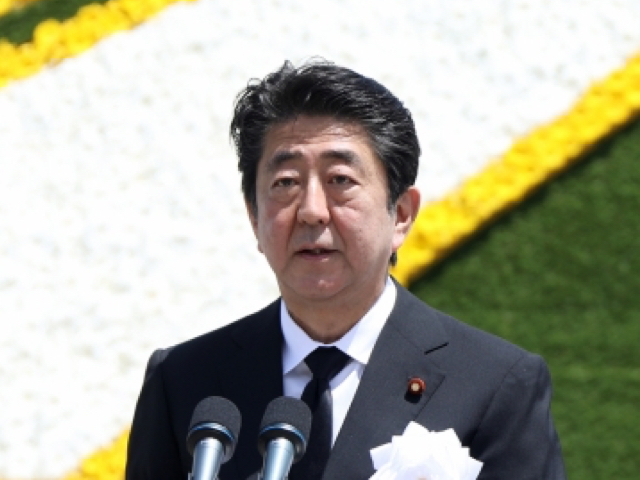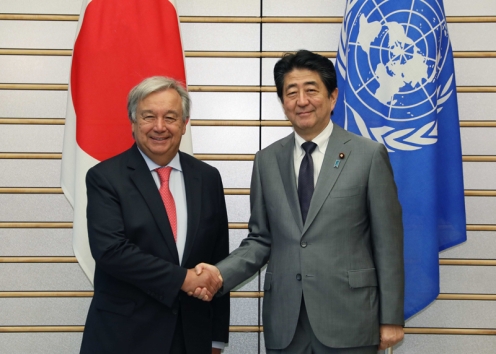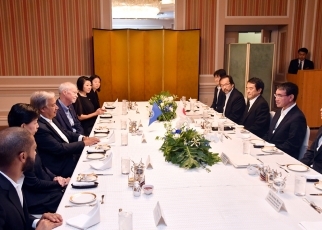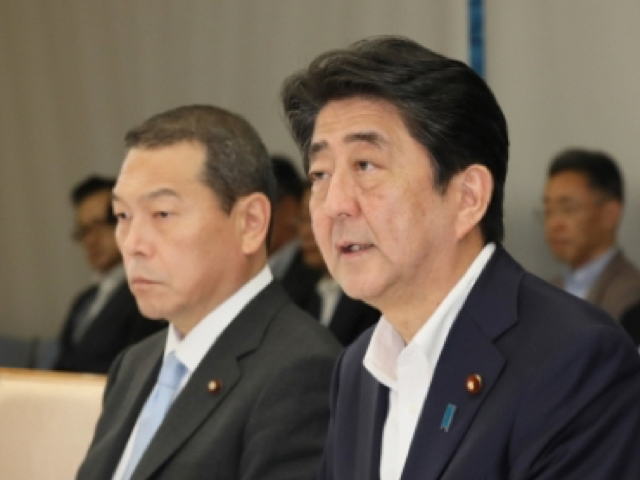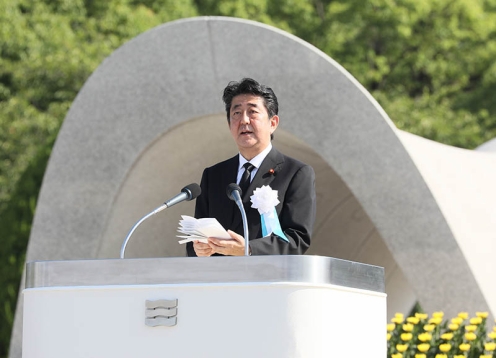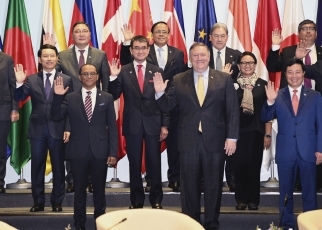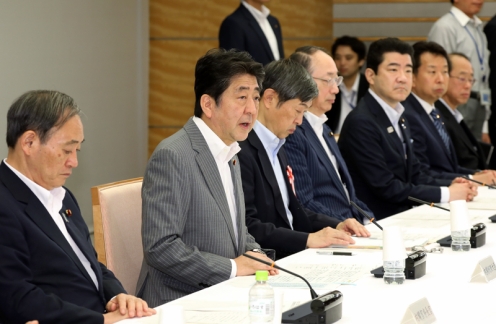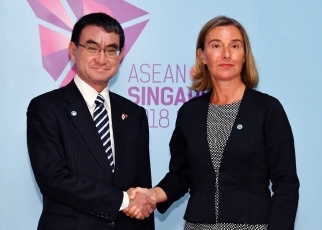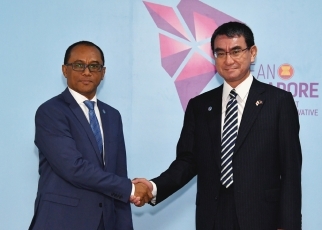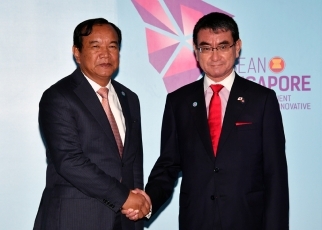The Nagasaki Peace Memorial Ceremony and Other Events
Cabinet Secretariat, Thursday, August 9, 2018
[Provisional Translation]
On August 9, 2018, Prime Minister Shinzo Abe attended the annual Nagasaki Peace Memorial Ceremony held in the Peace Park in Nagasaki City.
Approximately 5,200 people including atomic bomb survivors and bereaved family members, as well as representatives of 71 nations and regions, the European Union, international organizations such as the United Nations, and others attended the ceremony marking the 73rd anniversary of the atomic bombing, praying for the repose of the souls of the atomic bomb victims and for world peace.
Mr. Tomihisa Taue, Mayor of Nagasaki City, and representatives of bereaved family members, atomic bomb survivors and youth enshrined at the site the list of the names of atomic bomb victims whose passing was confirmed in the past year. Then the representatives of the bereaved family members and the atomic bomb survivors, and elementary, junior high, and high school student representatives offered water. Afterwards, the representatives of the bereaved family members and the atomic bomb survivors, the Prime Minister and other guests offered wreaths. At 11:02 a.m., the time that the atomic bomb was dropped, all the participants prayed in silence for one minute.
Then, following Mayor Taue’s Peace Declaration, the recital of the Promise for Peace by a representative of the atomic bomb survivors, and a choral song performed by elementary school students, Prime Minister Abe expressed his heartfelt prayers for the repose of the souls of the victims and delivered an address.
After the ceremony, the Prime Minister listened to requests from representatives of atomic bomb survivors at a hotel in Nagasaki City, and then held a press conference.
Afterwards, the Prime Minister visited residents of a nursing home for atomic bomb survivors in Nagasaki.
Address by Prime Minister Shinzo Abe at the Nagasaki Peace Memorial Ceremony
Cabinet Secretariat, Thursday, August 9, 2018
[Provisional translation]
Seventy-three years ago today, a single atomic bomb was dropped here on Nagasaki, depriving a large number of people, said to amount to 70,000, of their precious lives. It reduced the city to ashes in an instant, and even those who escaped death have suffered hardships beyond description. Young people were also mercilessly deprived of their dreams and bright futures.
I reverently express my sincere condolences to the souls of the great number of atomic bomb victims.
I also extend my heartfelt sympathy to those still suffering even now from the aftereffects of the atomic bomb.
The tragedies of Nagasaki and Hiroshima must never be repeated. As the only country to have experienced the horror of nuclear devastation in war, Japan has a mission of persistently working to bring about “a world free of nuclear weapons.”
In recent years, differences in the approaches of various countries on nuclear disarmament have become evident.
In order to truly bring about “a world free of nuclear weapons,” it is essential to gain the cooperation of both nuclear weapon states and non-nuclear weapon states, taking an accurate understanding of the tragic realities of the atomic bombings as a starting point.
Japan, firmly upholding the “Three Non-Nuclear Principles,” is determined to serve tenaciously as a mediator bridging the gap between the two and lead the efforts put forth by the international community.
As one concrete effort, this autumn we will convene here in Nagasaki a meeting of the Group of Eminent Persons for Substantive Advancement of Nuclear Disarmament, which we launched last year. Based on the knowledge of eminent persons to be gleaned through this group, Japan, working in close cooperation with United Nations Secretary-General Antonio Guterres, who joins us here today, will make active contributions so that the Review Conference of the Parties to the Treaty on the Non-Proliferation of Nuclear Weapons (NPT) to be held in 2020, the 50th anniversary of the treaty’s entry into force, will be a meaningful one.
Also, in order for the international community to work in unity to realize “a world free of nuclear weapons,” we must pass down the memory of that tragic experience as a memory held in common by all humankind, reaching beyond generations and national boundaries. People from around the world who visit Nagasaki and Hiroshima will witness the tragic realities of the atomic bombings and renew their desire for peace. Younger generations will hand down stories of experiences with the atomic bombings that have been passed on from atomic bomb survivors. As the only country to have experienced the horror of nuclear devastation in war, Japan, knowing more profoundly than any other nation the inhumanity of nuclear weapons, will steadily press forward with those efforts.
The Government, accepting the necessity of relief measures covering health and medical services and welfare of atomic bomb survivors, will stay in tune with atomic bomb survivors and continue to advance relief measures for them in a comprehensive manner. In particular, we are continuing to conduct screenings for recognizing atomic bomb diseases as quickly as we can so that we can convey the results as soon as possible.
In closing, here in Nagasaki, where prayers for eternal peace are offered continuously, I pledge that Japan will make its utmost efforts for the realization of “a world free of nuclear weapons” and eternal peace. I wish to conclude my remarks with my heartfelt prayers for the repose of the souls of those who fell victim to the atomic bombing here in Nagasaki. I also pray sincerely for the inner peace of the bereaved families and the atomic bomb survivors as well as all the participants today and the people of Nagasaki City.
Shinzo Abe
Prime Minister of Japan
August 9, 2018
Prime Minister Abe Meets with United Nations Secretary-General Guterres
Foreign Affairs, Wednesday, August 8, 2018
On August 8, commencing at 9:20 a.m. for approximately sixty-five minutes, Mr. Shinzo Abe, Prime Minister of Japan, held a meeting with H. E. Mr. António Manuel de Oliveira Guterres, the Secretary-General of the United Nations, who was visiting Japan. The overview of the meeting was as follows. After the meeting, the Prime Minister Abe and Secretary-General Guterres held a joint press occasion.
1. Opening remarks
(1) Prime Minister Abe welcomed Secretary-General Guterres on his visit to Japan since last December, and thanked the Secretary-General for his heart warming message and for offering support for the loss and damage caused by the heavy rain in western Japan.
(2) Prime Minister Abe welcomed Secretary-General Guterres as the first Secretary-General of the UN to attend the Nagasaki Peace Memorial Ceremony. Prime Minister Abe stated that Japan, the only nation in the world to be bombed with atomic weapons, stood ready to play a bridge building role between nuclear-weapon States and non-nuclear-weapon States in realizing “a world free of nuclear weapons” in cooperation with the United Nations. Secretary-General Guterres shared the Prime Minister’s view, and explained his recent comprehensive disarmament agenda.
2. North Korea
(1) With regard to North Korea, Prime Minister Abe stated his expectation that the agreement between the United States and North Korea including North Korea’s commitment towards complete denuclearization of Korean Peninsula, will be fully and expeditiously implemented.
(2) Prime Minister Abe and Secretary-General Guterres shared the view that the international community needs to firmly maintain the full implementation of UN Security Council resolutions in order to urge North Korea to take concrete actions.
(3) In addition, Prime Minister Abe again sought understanding and cooperation on the immediate resolution of the abductions issue, and Secretary-General Guterres expressed his support to the matter.
3. United Nations reform
(1) With regard to UN reform, Prime Minister Abe stated that he supported Secretary General Guterres' efforts to reform for enhancing the efficiency and effectiveness of the UN, and would continue to closely cooperate with the UN.
(2) Prime Minister Abe further stated that, along with UN reform, the reform of the UN Security Council was a matter of urgency, and expressed his expectation that the Secretary-General would exercise strong leadership on this matter.
4. Global and other issues
(1) Prime Minister Abe and Secretary-General Guterres exchanged views on a wide range of other global issues.
(2) Prime Minister Abe stated that Japan would address various issues in the international community, such as the promotion of SDGs including in the areas of education and health, in cooperation with the UN which was the core of multilateralism.
Foreign Minister Kono Had a Breakfast Meeting with United Nations Secretary-General Guterres
Foreign Affairs, Thursday, August 9, 2018
On August 9, commencing at 7:20 a.m. for approximately fifty minutes, Mr. Taro Kono, Foreign Minister of Japan, held a breakfast meeting in Nagasaki with H. E. Mr. António Manuel de Oliveira Guterres, the Secretary-General of the United Nations. The overview of the meeting was as follows.
1. Minister Kono welcomed the Secretary-General’s Agenda for Disarmament, which was expected to build up the momentum for advancing disarmament and non-proliferation. The Secretary-General expressed his appreciation.
2. The two sides also exchanged views on the reform of the UN. Minister Kono welcomed UN reform for enhancing the efficiency and effectiveness of the UN. Minister Kono further stated that the reform of the Security Council was a matter of urgency and expressed his expectation that the Secretary-General would take initiatives on this matter.
3. The two sides held exchange of views on North Korea and shared the view that it was important for UN Member States to continue the full implementation of relevant United Nations Security Council resolutions.
4. The two sides exchanged views on a wide range of other global issues and regional issues.
17th Meeting of the Emergency Response Headquarters for the Heavy Rain in July 2018
Cabinet Secretariat, Tuesday, August 7, 2018
Provisional Translation]
On August 7, 2018, Prime Minister Shinzo Abe attended the 17th meeting of the Emergency Response Headquarters for the Heavy Rain in July 2018 at the Prime Minister’s Office.
The Prime Minister said in his opening address,
“The day before yesterday, I visited some of the affected areas in Hiroshima Prefecture, one month after the disaster. In Higashihiroshima City, work to restore the JR Sanyo Honsen Line and prefectural roads that have collapsed is proceeding at a high pace. Furthermore, in Kure City and Saka Town, which have been buried under large amounts of sediment, strenuous efforts are being made to remove the sediment and disaster-related waste. I would like to once again express my heartfelt respect to everyone involved for their diligent efforts amidst the extreme heat.
Amidst the extreme heat, those affected by the recent disaster are being forced to live hard lives as evacuees, full of concern. Construction has started on 490 temporary emergency housing units in the three prefectures of Hiroshima, Okayama and Ehime, approximately 390 units of which are scheduled to be completed by the latter half of this month. We will also continue such efforts to secure the necessary housing so that all those affected can transition away from living at the evacuation centers as quickly as possible. I would like all of you to implement the recently compiled support package, paying attention to the speed, and exert every effort towards restoration and reconstruction of the disaster areas, including rebuilding people’s lives and restoring ‘nariwai (occupations and livelihoods that sustain people’s daily lives).’ I also ask all of you to offer your maximum support for the removal of accumulated sediment and the dredging of rivers as much as possible before the typhoon season enters into full swing, regardless of whether the affected sites are managed nationally or prefecturally.
The powerful Typhoon No. 13* is approaching the Kanto region, and there is concern that it could strike the region. In addition to the impact of the storm front, which brought record heavy-rains to Yamagata Prefecture and other areas, there is also concern that the heavy rains and strong winds could continue for a longer period due to the slow movement of the typhoon. I ask you to maintain the utmost vigilance. A short while ago, Minister of State for Disaster Management Okonogi convened an Inter-Agency Disaster Alert Meeting, and reinforced the level of vigilance. Leveraging the experience you have accumulated from dealing with the recent heavy rain event, I ask you to disseminate the relevant information, without worrying that it might ultimately have been unnecessary, in a manner that is easy to understand and will encourage people to evacuate as soon as possible and proactively provide support to the municipalities’ responses, such as securing evacuation centers and improving living conditions in these centers.
I also ask all citizens to stay tuned to the latest weather, disaster, and other relevant information, and be mindful of evacuating as early as possible.”
*Typhoon Shanshan
The Prime Minister Attends the Hiroshima Peace Memorial Ceremony and Other Events
Cabinet Secretariat, Monday, August 6, 2018
[Provisional Translation]
On August 6, 2018, Prime Minister Shinzo Abe attended the annual Hiroshima Peace Memorial Ceremony held in the Peace Memorial Park in Hiroshima City.
Approximately 50,000 people including atomic bomb survivors and bereaved family members, as well as representatives of 85 nations, the European Union, and international organizations such as the United Nations attended the ceremony marking the 73rd anniversary of the atomic bombing.
Mr. Kazumi Matsui, Mayor of Hiroshima City, and the representatives of the bereaved family members added the names of atomic bomb victims whose passing was confirmed in the past year to the cenotaph, and Prime Minister Abe, the representatives of the bereaved family members and the atomic bomb victims offered flowers. Afterwards, the Peace Bell was rung at 8:15 a.m., the time when the atomic bomb was dropped, and all the participants offered a minute of silent prayer.
Next, after Mayor Matsui offered a Peace Declaration and two child representatives recited the Promise for Peace, Prime Minister Abe delivered an address.
After the ceremony, the Prime Minister moved to a hotel in Hiroshima City and attended a meeting to listen to requests from representatives of atomic bomb survivors. After receiving requests from the representatives of seven groups of atomic bomb survivors, he held a press conference.
Afterwards, the Prime Minister visited residents of a nursing home for atomic bomb survivors in Hiroshima.
Address by Prime Minister Shinzo Abe at the Hiroshima Peace Memorial Ceremony
Cabinet Secretariat, Monday, August 6, 2018
[Provisional translation]
A single atomic bomb, destroying this city in a mere instant, claimed what is said to be well more than 100,000 precious lives. Over the 73 years that have passed since that day, even those who escaped death have suffered hardships beyond description. Young people were also mercilessly deprived of their dreams and bright futures.
I reverently express my sincere condolences to the souls of the great number of atomic bomb victims.
I also extend my heartfelt sympathy to those still suffering even now from the aftereffects of the atomic bomb.
The tragedies of Hiroshima and Nagasaki must never be repeated. As the only country to have experienced the horror of nuclear devastation in war, Japan has a mission of persistently working to bring about “a world free of nuclear weapons.”
In recent years, differences in the approaches of various countries on nuclear disarmament have become evident.
In order to truly bring about “a world free of nuclear weapons,” it is essential to gain the cooperation of both nuclear weapon states and non-nuclear weapon states, taking an accurate understanding of the tragic realities of the atomic bombings as a starting point.
Japan, firmly upholding the “Three Non-Nuclear Principles,” is determined to serve tenaciously as a mediator bridging the gap between the two and lead the efforts put forth by the international community.
As one concrete effort, last year we convened a meeting of the Group of Eminent Persons for Substantive Advancement of Nuclear Disarmament here in Hiroshima.
Having gleaned the knowledge of eminent persons through this Group, Japan will make active contributions so that the Review Conference of the Parties to the Treaty on the Non-Proliferation of Nuclear Weapons (NPT) to be held in 2020, the 50th anniversary of the treaty’s entry into force, will be a meaningful one.
In addition, we have a duty to continue to communicate to future generations and to the world the inhumanity of nuclear weapons.
The Government of Japan will steadily press forward with efforts in which younger generations hand down stories of experiences with the atomic bombings that were passed on from atomic bomb survivors.
The Government, accepting the necessity of relief measures covering health and medical services and welfare of atomic bomb survivors, will stay in tune with atomic bomb survivors and continue to advance relief measures for them in a comprehensive manner. In particular, we are continuing to conduct screenings for recognizing atomic bomb diseases as quickly as we can so that we can convey the results as soon as possible.
In closing, here in Hiroshima, where prayers for eternal peace are offered continuously, I pledge that Japan will make its utmost efforts for the realization of “a world free of nuclear weapons” and eternal peace. I wish to conclude my remarks with my heartfelt prayers for the repose of the souls of those who fell victim to the atomic bombing here in Hiroshima. I also pray sincerely for the inner peace of the bereaved families and the atomic bomb survivors as well as all the participants today and the people of Hiroshima City.
Shinzo Abe
Prime Minister of Japan
August 6, 2018
Emergency Assistance to Myanmar in Response to the Flood Disaster
JICA, Monday, August 6, 2018
The Japan International Cooperation Agency will provide emergency relief goods as below in response to a request from the Government of the Republic of the Union of Myanmar relating to the serious flood.
1. Disaster situation
The flood disaster, which happened around the end of July, has caused serious human and property damage. According to the government of Myanmar, the damage situation as of 3rd August was as follows:
Deaths 12
Affected 166,000 (approximately)
Damaged houses 37,000 (approximately)
2. Goods supplied
A. Emergency relief goods (from the JICA warehouse in Singapore)
Tents
Water Storage Tanks
B. Shipping schedule
The goods will be transported from the JICA warehouse in Singapore to
Yangon on the next available flight.
The 25th ASEAN Regional Forum (ARF) Ministerial Meeting
Foreign Affairs, Saturday, August 4, 2018
Foreign Minister Mr. Taro Kono attended the 25th ASEAN Regional Forum (ARF) Ministerial Meeting which was held in Singapore, on August 4 from 14:00 to 17:15 (local time). The overview of the meeting, focusing on Minister Kono's comments, whose comments are basically identical to the EAS meeting, but remarks are made to avoid duplication, is as follows.
1 ARF activities
Minister Kono stated that Japan highly values the confidence building facilitated by the ARF, and we will continue to contribute to the ARF process. He also expressed his respect to the effort of the ASEAN regional cooperation in developing a rules-based community sharing values and norms in diversity.
Many participants appreciated the ARF as an appropriate forum not only for confidence building among the participants but also for candid exchanges of opinions on non-traditional threats such as cyber, terrorism, refugees and climate change. With regard to ARF-ISM on ICTs Security, of which Japan, Malaysia and Singapore took initiative, the Terms of Reference (TOR) and Confidence-Building Measures (CBMs), including the ones proposed by Japan, were adopted.
2 Exchange of views on regional and international issues
(1) Free and Open Indo-Pacific Strategy
Minister Kono stated that Japan is willing to work with all the ARF members to coordinate Japan's Free and Open Indo-Pacific Strategy with other concepts, saying that he would not reiterate the details of Japan's Strategy, which he spoke in the EAS meeting. He also stated that ASEAN, sitting in the middle of the Indian Ocean and the Pacific, plays the key role in promoting stability in the region. Japan will promote the ASEAN centrality and unity through its Free and Open Indo-Pacific Strategy.
Some participants explained their views and concepts on the Indo-Pacific. Reaffirming the commonality of these views and concepts, they expressed their intention to continue discussing the way to deepen coordination among them.
(2) North Korea
Minister Kono stated that Japan considers the United States-DPRK Joint Statement as a step toward comprehensive resolution of outstanding issues, and strongly hopes that it will lead to North Korea's actions toward achieving the full implementation of the United Nations Security Council resolutions (UNSCRs). He also stated that Japan's position based on the Japan-DPRK Pyongyang Declaration has never changed, and as Japan has often stated, it will make earnest efforts to resolve outstanding issues between Japan and North Korea in order to normalize the relationship.
Many countries stressed the importance of realizing complete denuclearization of North Korea and of continued full implementation of the relevant UNSCRs by the international community.
(3) South China Sea
After stating that he would refrain from repeating Japan's view since he has already spoken in the EAS meeting. Minister Kono stressed that the parties concerned need to resolve their conflict peacefuly and to pursue demilitarization of the region. He also stated that ARF also needs to deliver a strong message reflecting the basic principles that ASEAN has upheld.
Almost all of the participants took up the South China Sea issue and referred to the importance of securing the freedom of navigation and overflight as well as peaceful resolution of conflicts in accordance with the international law including the United Nations Convention on the Law of the Sea (UNCLOS). There were also many participants which stressed the importance of non-militarization as well as self-restraint. Moreover, many participants referred to the necessity of an effective Code of Conduct (COC).
(4) Counter-terrorism
Minister Kono stated that Terrorism and violent extremism are the imminent challenges to the region. Japan gives priorities not only to traditional counter-terrorism measures but also to measures to prevent violent extremism (PVE) that address root causes of terrorism. He expressed that Japan will continue to assist capacity building in border control and mitigation of violent extremism in the region.
Many countries expressed concerns about the proliferation of terrorism and violent extremism, and underscored the importance of confronting counter-terrorism and violent extremism through building society marked by tolerance and respect to diversity.
(5) Rakhine State
Minister Kono stated that peace and stability of Rakhine State is a regional concern. He expressed that Japan welcomes the announcement of the members of the Independent Commission of Enquiry and strongly expects that the commission will conduct a credible investigation in a transparent manner. He also stated that Japan will continue to provide the utmost support to Myanmar's efforts, in collaboration with ASEAN.
Many participants expressed concerns about the situation in Rakhine State and emphasized the importance of the support by the whole region.
Meeting on a Long-Term Strategy under the Paris Agreement as Growth Strategy
Cabinet Secretariat, Friday, August 3, 2018
[Provisional Translation]
On August 3, 2018, Prime Minister Shinzo Abe held the first meeting on a Long-Term Strategy under the Paris Agreement as Growth Strategy at the Prime Minister's Office.
The Prime Minister said in his opening address,
“The situation surrounding the environment and the economy has completely changed over these past few years. Flows of global funds are changing greatly, as seen in the fact that ESG (environment, social, and governance) investments have grown by more than 1 quadrillion yen over five years, and the increase in green bond issuance by 50 times.
Measures against global warming are no longer a cost for companies. They are a source of competitiveness. Companies that actively fight against environmental issues attract funds from all around the world, enabling them to prepare for the next phase of their growth and take further measures. This change, which can truly be called a virtuous cycle between the environment and growth, has spread throughout the world at an amazing pace in the past five years or so.
We will promote technological innovations led by businesses by proactively encouraging this virtuous cycle. Up until now, measures against global warming have consisted of obligatory measures in response to the Government's initiatives. We now need a massive paradigm shift in response to the changes of this era. Japan needs to have a mindset to materialize strong growth of our country by making full use of the strengths of Japanese companies and generating innovation, rather than simply extending existing businesses.
From such a perspective, I would like to receive proposals on a new policy direction not limited by past precedent towards the establishment of the long-term strategy under the Paris Agreement. Today, we have gathered those who can contribute to conversations with a broader perspective that transcends the boundaries of previous arguments.
I hope that all of you will present a new vision that drives international trends forward while taking a grand panoramic perspective on financial trends, the reality of business, and global shifts in particular.
Next year, Japan will chair the G20. The Government of Japan will exercise firm leadership so that the entire international community can keep pace with each other with responses against climate change issue. I request that all of you have a candid, active discussion.”
Japan-EU Foreign Ministers’ Working Lunch
Foreign Affairs, Friday, August 3, 2018
On August 3, during his visit to Singapore to attend the ASEAN-related Foreign Ministers’ Meetings, Mr. Taro Kono, Minister for Foreign Affairs of Japan held a brief working lunch for approximately 20 minutes commencing at 1:20 p.m. in local time with H.E. Ms. Federica Mogherini, the High Representative of the European Union for Foreign Affairs and Security Policy, Vice-President of the European Commission. The overview of the working lunch is as follows.
1. Japan-EU Relations
(1) Minister Kono and High Representative Mogherini welcomed the signing of the Japan-EU Economic Partnership Agreement (EPA) and the Strategic Partnership Agreement (SPA) on the occasion of the Japan-EU Summit on July 17, and agreed that Japan and the EU will continue to cooperate for early entry into force of both agreements. In addition, they agreed on the importance of further strengthening the Japan-EU relationship building on both agreements, and in particular, promote concrete dialogue and cooperation in a wide range of areas based on the SPA.
(2) They confirmed their intention to work closely in various ways towards the Asia-Europe Meeting (ASEM) Summit to be held in Brussels in October this year.
2. Regional and International Affairs
(1) Minister Kono and High Representative Mogherini agreed to provide maximum support to the efforts of the United States towards North Korea’s complete, verifiable and irreversible dismantlement (CVID) of all weapons of mass destruction and ballistic missiles of all ranges. Moreover, they also agreed to continue Japan-EU cooperation for full implementation of the relevant United Nations Security Council (UNSC) resolutions.
(2) They also exchanged views on other issues such as Iran nuclear agreement and maritime security.
Japan-Timor-Leste Foreign Ministers’ Meeting
Foreign Affairs, Friday, August 3, 2018
On August 3, commencing at 11 a.m. (local time) for approximately 20 minutes, Mr. Taro Kono, Minister for Foreign Affairs, who is visiting Singapore to attend Association of Southeast Asian Nations (ASEAN)-related Foreign Ministers’ Meetings, held a foreign ministers’ meeting with H.E. Dr. Dionisio da Costa Babo Soares, Minister for Foreign Affairs and Cooperation, the Democratic Republic of Timor-Leste. The overview of the meeting is as follows.
1. Minister Kono congratulated Minister Babo on his appointment as Minister for Foreign Affairs and Cooperation, stating that Japan has consistently supported Timor-Leste’s nation-building, and that Japan’s stance of cooperating toward further growth and development in Timor-Leste will not change in the future either. Minister Kono explained that he hopes to discuss the direction of future cooperation at this meeting, the first Japan-Timor-Leste Foreign Ministers’ meeting in five years. In response, Minister Babo expressed his gratitude for Japan’s long-standing support, and expressed hishope to enhance bilateral cooperation.
2. The two ministers confirmed that they will promote bilateral cooperation in fields such as security, economy, infrastructure, human resources development, people-to-people exchanges and maritime issues. In addition, Minister Kono stated that he will continue to consider supporting Timor-Leste’s accession to ASEAN, and conveyed his intention to strengthen collaboration based on the “Free and Open Indo-Pacific Strategy.” Minister Babo expressed his agreement.
3. The two ministers shared the view that they will meet again in Tokyo or Dili in the near future.
Japan-Cambodia Foreign Ministers' Meeting
Foreign Affairs, Saturday, August 4, 2018
On August 4, commencing at 5:30 p.m. (6:30 p.m., Japan time) for approximately 40 minutes, Mr. Taro Kono, Minister for Foreign Affairs, who is visiting Singapore to attend Association of Southeast Asian Nations (ASEAN)-related Foreign Ministers' Meetings, held a meeting with H.E. Mr. Prak Sokhonn, Senior Minister and Minister of Foreign Affairs and International Cooperation, Kingdom of Cambodia. The overview of the meeting is as follows.
At the beginning, Minister Kono expressed gratitude for the sympathies extended by Foreign Minister Prak Sokhonn and many Cambodian citizens in connection with the damage caused by torrential rain in July. Then, Minister Kono said that he would like to discuss mainly the relationship between the two countries at the meeting. In response, Foreign Minister Prak Sokhonn expressed gratitude for Japan's continued support to Cambodia, including its support for election reform.
Minister Kono explained that Japan attached importance to last month's election being conducted in a way that appropriately reflected the will of the Cambodian people, and provided necessary assistance and advice, but there were various points that were regrettable, such as the large number of invalid votes cast in the election. Furthermore, Minister Kono stated that as a friend that has been supporting Cambodia's path of development and democratization since peace was achieved, Japan hopes that Cambodia will continue to walk that path, and to that end, Japan hopes that all Cambodia's citizens will be united in pursuing the development of the nation even more powerfully by promoting the democratic process through initiating political dialogue and ensuring the freedoms and rights of the people. Minister Kono stated that Japan will spare no effort to cooperate with Cambodia in its endeavor. In response, Foreign Minister Prak Sokhonn expressed the essential standpoint of the Government of Cambodia.
In addition, Minister Kono presented Minister Prak Sokhonn with a gift (Note) at the meeting.
(Note: The gift was a portrait of the Japan and ASEAN foreign ministers created by Manga Designers Lab).

























